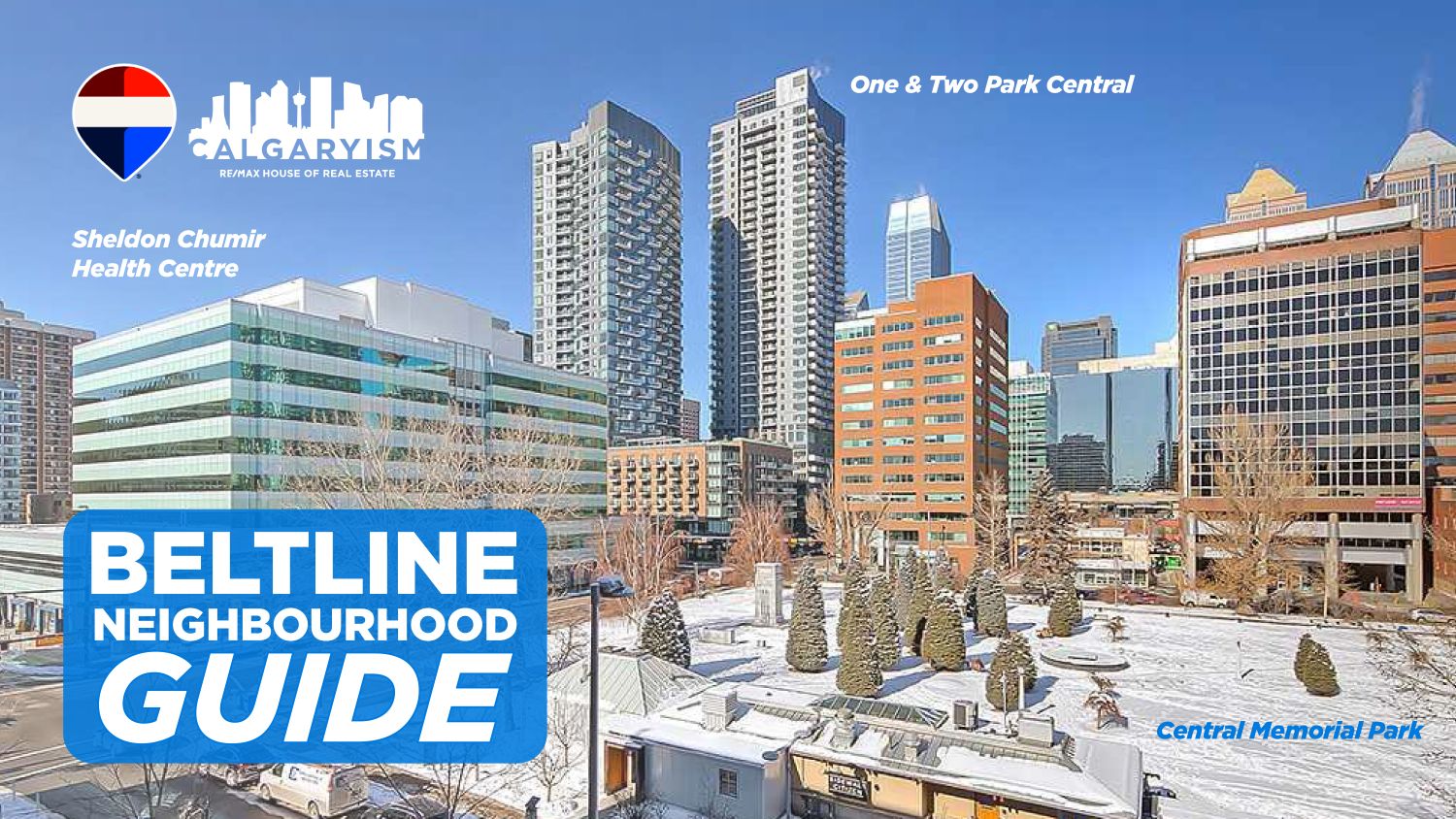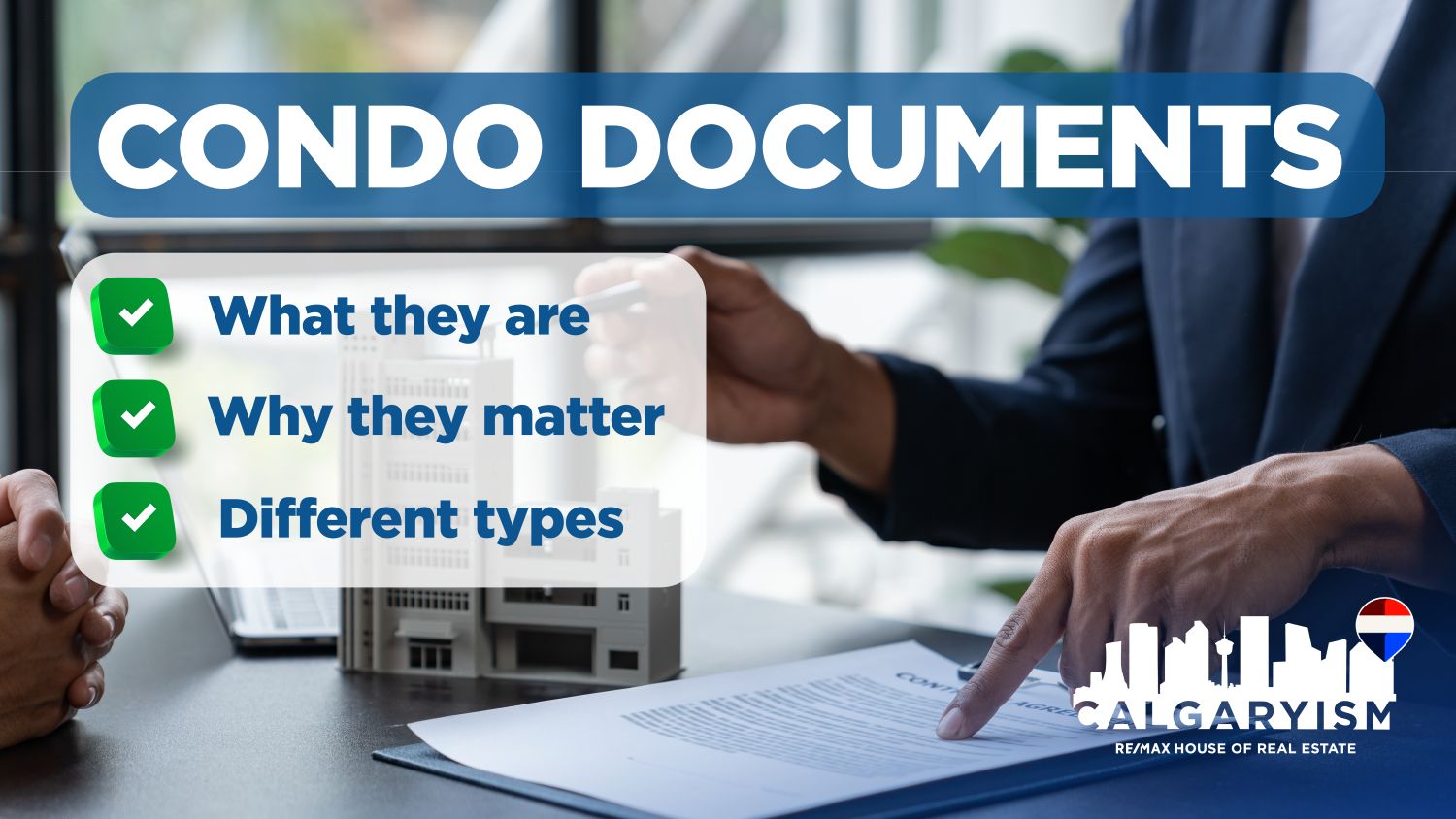Main Content
Attached vs Detached Home: 8 Key Differences Before Buying
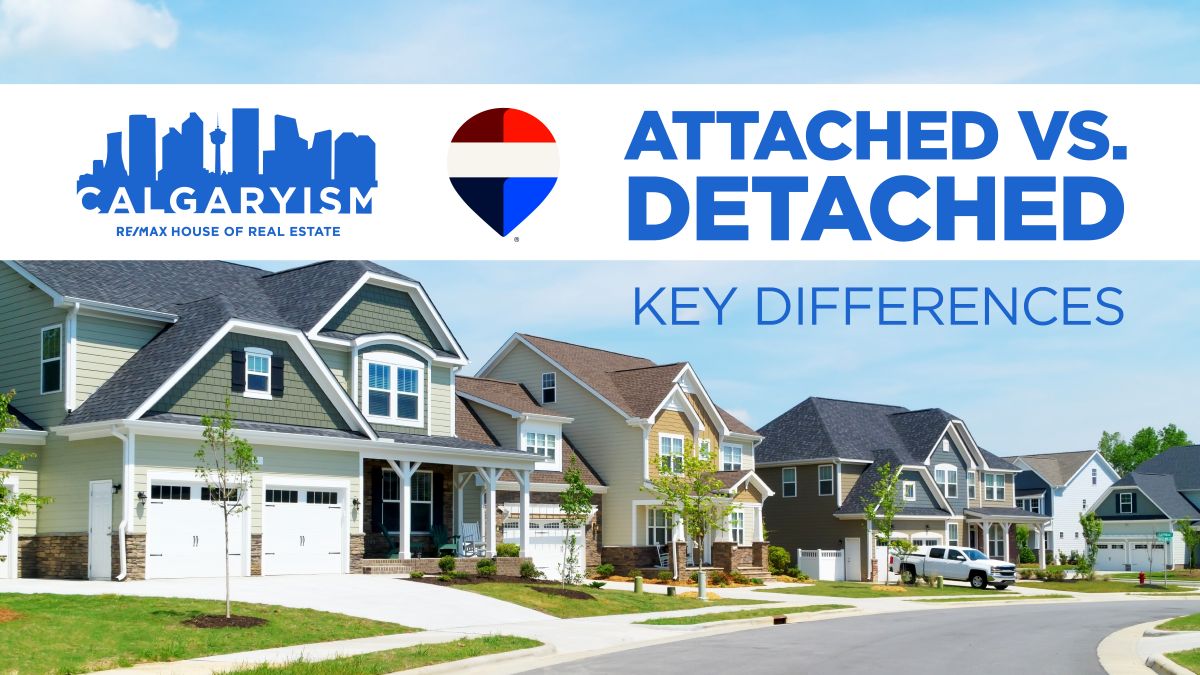
Choosing between an attached and detached home is a crucial decision you’ll make when buying real estate. Each option comes with its own set of pros and cons that can significantly impact both your lifestyle and finances.
Below, we explore the key differences between detached and attached single-family properties to help you determine which one best fits your real estate goals.
What is an Attached Home?
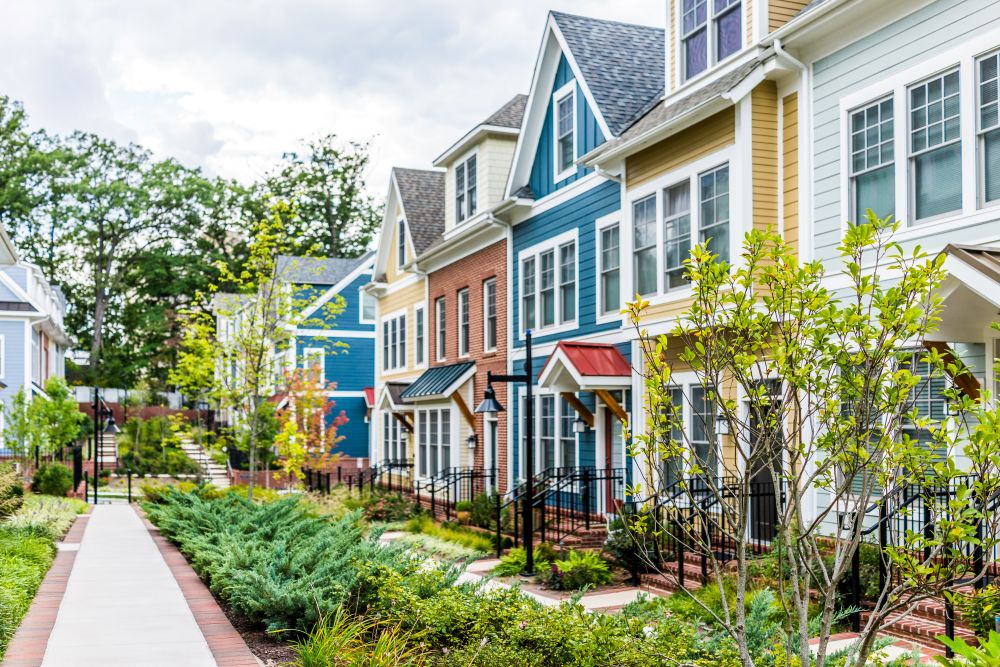
An “attached” home is a residence that shares one or more common walls with adjacent properties. It shares one or more walls with neighbouring units, offering a unique blend of privacy and community living. Townhouses, duplexes, and semi-detached houses are often considered attached single-family homes, as each unit is physically connected to one or more neighbouring units.
These properties are popular among buyers seeking affordability and a sense of community. Attached residences also offer a lower-maintenance lifestyle, as these developments sometimes have condo fees that cover exterior landscaping, snow shovelling, and other common expenses.
Key Features of Attached Properties
Shared Walls or Structure: Attached homes are physically connected to one or more neighbouring units, sharing at least one wall or other structural elements; in many instances, attached properties may have two or three connected walls to adjacent homes.
Smaller Lot Size: These homes are built on more compact lots, resulting in less private yard space and entranceways, but usually less outdoor upkeep.
Improved Sound Insulation: Modern construction methods often include enhanced soundproofing materials in shared walls, helping to minimize noise transfer between units. However, this isn’t always guaranteed; make sure to do your due diligence and verify that the soundproofing meets your standards before buying an attached home.
Individual Entrances: Unlike condos with shared communal access points, attached properties typically have their own private entrances, offering residents a sense of independence while remaining part of a larger complex.
More Affordable: When comparing detached vs attached homes, the latter are usually lower-priced, which, despite condo fees in certain situations, still makes them a more cost-effective option for home ownership.
Enhanced Security: Living in an attached complex or an attached infill, for example, often provides enhanced security for your home. Closer proximity to neighbours means more eyes are on your house.
What is a Detached Home?
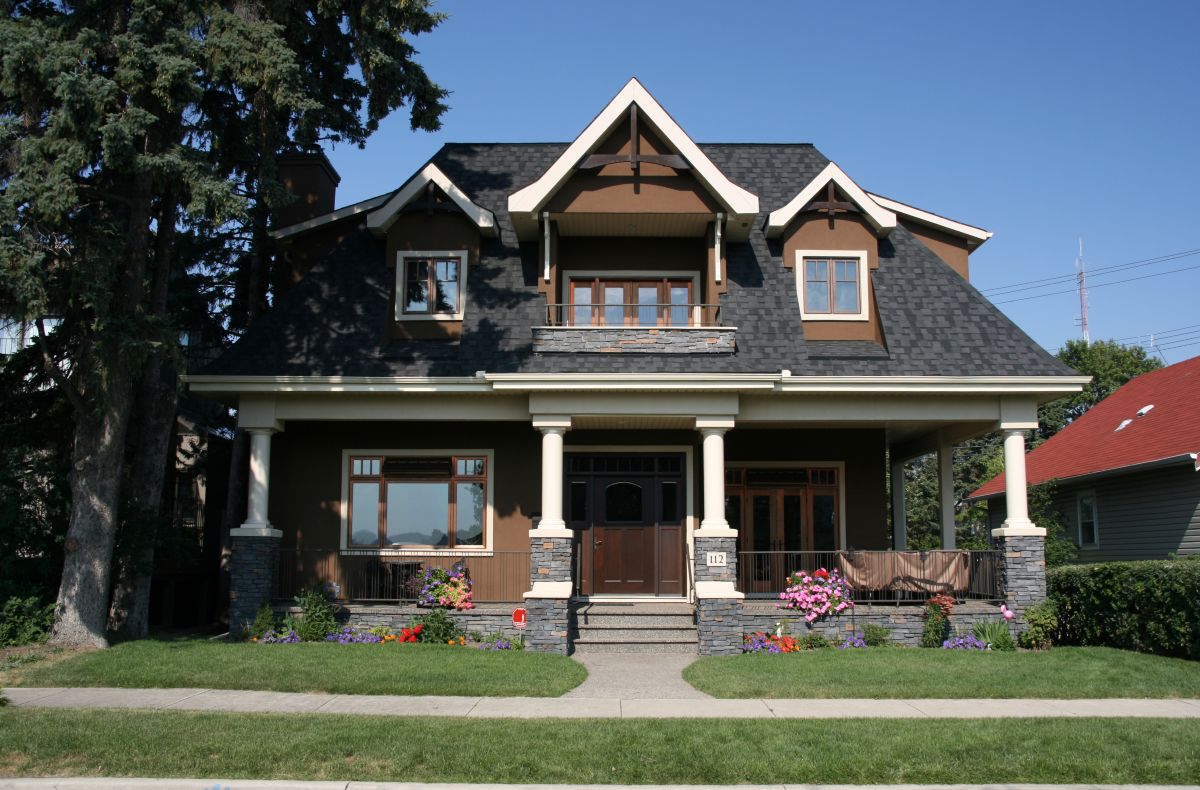
A detached home is an entirely stand-alone residential property that does not share any common walls, roofs, or foundations with other units. Also often called a “single-family” home, estate mansions, front-drive garage houses, bungalows, and infills are some examples of detached houses you’ll find on the market.
Detached homes also sit on their own land parcel, providing homeowners with added privacy and full control over exterior and interior renovations. They also usually sit on larger lots than their attached counterparts, providing more living space inside and out for families. Also see these benefits of buying a detached home.
Key Features of Detached Properties
No Shared Wall: A detached home stands alone, with no walls shared with neighbouring houses, ensuring complete structural independence, greater privacy, and reduced sound pollution.
Larger Lots: Detached properties are typically situated on bigger parcels of land, providing ample space for gardens, trampolines, play areas, and other outdoor amenities perfect for families.
More Privacy: The physical separation from other homes reduces noise and disturbances, creating a quieter, more private living environment.
Full Control: Homeowners have complete ownership and responsibility for the interior and exterior of their property, including renovations, landscaping, and maintenance decisions, provided the community’s architectural controls and general bylaws are followed.
Greater Customization: With no shared structures, detached property owners can freely remodel, expand, or personalize their home and surrounding land to suit their preferences.
Better Market Value: Comparing attached vs detached homes, the latter generally holds higher resale value and is highly sought after on the market, making it a more ideal long-term investment in many instances.
Important Differences & Considerations: Attached vs. Detached
Several key features differentiate single-family attached vs detached properties. Understanding these differences is critical to buying the right property for your real estate goals.
#1 – Ownership Structure
Attached: Often have individual ownership of the living space, while exterior features like roofs, siding, or landscaping are managed collectively through a condo board or homeowners’ association. This arrangement can simplify upkeep for busy owners who prefer to have common maintenance and repairs coordinated on their behalf. However, attached homeowners are also subject to association rules and may have less autonomy in making exterior changes or customizing exterior elements, such as landscaping. Not all attached homes pay condo fees; for example, many freehold townhomes do not pay any monthly fees for upkeep and maintenance.
Detached: Enjoy full, independent ownership of the house and its land parcel, granting total control over both interior and exterior modifications. This means you can renovate, add to, or landscape as you wish, provided you comply with local bylaws or community guidelines. If you value autonomy and long-term flexibility, this ownership structure can be especially attractive.
#2 – Outdoor Yard Space
Attached: Outdoor space is often smaller and, in some designs, shared among several units or managed by the association, which can make maintaining a tidy yard easier and less time-consuming. While private patios or small yards are sometimes included, they’re often modest in size compared to detached homes. This is ideal for those who want some outdoor living without the hassle of extensive yard work, but it may limit opportunities for large gardens or play areas for children.
Detached: Offer sizable, entirely private yards, perfect for children, pets, gardening, or entertaining guests. Homeowners can use or modify the yard space however they see fit, installing playgrounds, fire pits, or pools if desired. However, with these perks comes the responsibility for all landscaping and maintenance, which can require significant amounts of time and money.
#3 – Indoor Basements
Attached: While some attached homes, such as duplexes, may have basements, not all attached properties do. Therefore, if you need an indoor basement for storage or another purpose, finding an attached property with one will be key to accomplishing your real estate goals.
Detached: Commonly feature full-size basements, with the freedom to fully develop or customize the space without needing permissions from a homeowners’ association. Owners often use these basements as rental suites, entertainment areas, fitness areas, or additional sleeping quarters for family and visitors, maximizing both living space and the property’s overall value. This flexibility makes detached homes ideal for buyers who want room to grow into or who want to earn a secondary income by using their property to the fullest.
#4 – Affordability & Expenses
Attached: Generally cost less to buy and have lower property taxes than detached properties, making them attractive for first-time buyers or those seeking lower mortgage payments. Many attached homes are part of a condo board that charges monthly maintenance fees and shares various amenities, such as a communal garbage bin, but these fees can also help budget by covering major repairs or ongoing expenses. Still, buyers should be wary of special assessments or future increases in condo fees.
Detached: Often comes with higher purchase prices and increasing ongoing expenses, such as property taxes and insurance. All maintenance, repairs, and upgrades—whether minor or major—are the sole responsibility of the owner. While this can mean more out-of-pocket spending, it offers greater control over when and how money is spent compared to monthly condo fees—unless the property is part of a managed community (which is extremely rare).
#5 – Investment Opportunities
Attached: Often maintain strong rental appeal and steady appreciation. They work well for buyers seeking manageable income properties or those who prefer a “lock-and-leave” lifestyle. However, resale values for attached vs detached properties may not rise as quickly, and owners may have fewer options to influence the property’s market price due to architectural or condo board controls.
Detached: Traditionally see greater price appreciation and resale demand over time, especially in established or family-oriented neighbourhoods. The ability to upgrade or expand freely makes these homes more attractive to a broader group of buyers and typically increases the property’s future value. This long-term investment potential is a key reason many people aspire to own a detached home. In many instances, once the mortgage is paid off, these properties become the homeowner’s retirement nest egg.
#6 – Construction Type & Maintenance
Attached: Construction tends to be standardized, with shared walls and sometimes no basements to maximize efficiency and lower building costs. Regular exterior maintenance—like roofing, siding, and landscaping—is typically handled by the condo board or homeowners’ association, streamlining ownership for those who prefer less hands-on upkeep.
Detached: Construction is fully independent, allowing for a full spectrum of designs, personalized features, and unique layouts. This level of customization is fully realized when building a brand-new custom infill property from scratch. Maintenance and repairs fall to the homeowner, including fixing the roof, painting the exterior, and keeping up the landscaping. This can lead to higher costs and greater involvement, but allows for maximum customization and pride of ownership.
#7 – Architectural Styles & Floor Plans
Attached: Typically uses straightforward architecture unless part of a custom inner-city infill development. Floor plans are commonly mirrored on both sides of the attached wall, making it more cost-effective for developers.
Detached: Depending on the type of detached house, architectural styles can range from simple in cookie-cutter suburbs to luxuriously modern in rural estate mansions or inner city infills. Once again, the sky is the limit when it comes to fully customizing a home and lot owned by the homeowner, with no shared walls, garages, or other common areas.
#8 – Community & Lifestyle
Attached: These communities often have a built-in sense of neighbourliness, thanks to close quarters, shared spaces, and organized social events or amenities. It’s easier to meet neighbours, participate in block activities, and enjoy common spaces, which can be especially appealing for families or those seeking a supportive social environment. However, close proximity can sometimes mean less privacy or occasional noise through the walls or from outside.
Detached: Residents enjoy more personal space and freedom, with less likelihood of noise transfer or daily interruptions from neighbours. While you may need to put in a bit more effort to socialize or meet others, detached living offers a tranquil setting that’s ideal for privacy-minded individuals and those who value peace and quiet. You set your own rules and rhythms, enjoying your property undisturbed.
Step-by-Step Decision-Making Process
Making the correct choice between attached and detached homes doesn’t have to be overwhelming. Follow this step-by-step process to ensure you find the best fit for your needs:
- Assess your budget: Start by determining your price range, factoring in not only the purchase price but also ongoing costs such as property taxes, maintenance expenses, and homeowner association fees.
- Evaluate your lifestyle: Think about what matters most to you—do you want more personal space, or are shared amenities and a low-maintenance lifestyle more appealing?
- Research locations: Explore different neighbourhoods, from urban centers with attached homes to suburban and rural areas where detached homes and larger yards are more common.
- Compare attached and detached homes: Weigh the pros and cons of each, considering factors like shared walls, exterior upkeep, and maintenance responsibilities.
- Consider long-term plans: Reflect on your future—are you planning to expand your family, downsize, or retire soon? Your long-term goals can influence whether an attached or detached home is the better investment.
- Visit properties: Tour both attached and detached homes to get a feel for their layouts, outdoor space, and community features.
- Consult experts: Seek advice from real estate professionals, financial advisors, or current homeowners who can share insights about living in attached and detached homes.
By following these steps, you’ll be able to make an informed decision that balances your budget, lifestyle preferences, and long-term plans—helping you find the perfect home, whether it’s attached or detached.
Detached vs Attached Home Based on Lifestyle
- Travellers: Like to leave for extended trips? An attached home’s managed exterior and proximity to neighbours offer peace of mind and added security while travelling.
- Pet Owners/Gardeners: Dream of a big backyard or your own vegetable patch? Detached homes typically offer more than enough space necessary to grow a variety of food.
- Entertainers: Detached houses provide more space for large family gatherings, fire pits, outdoor movie nights, and other family-oriented activities.
- Minimalists/Busy Urbanites: Attached family homes are ideal for those seeking a low-maintenance lifestyle in walkable communities. These residences, which share walls with neighbouring units, offer efficiency and convenience, making them perfect for busy urbanites and minimalists.
- Empty Nesters & Snow Birds: The added security and low maintenance offered by many attached homes vs. detached properties make them more appealing to people in their golden years looking to travel and experience life to the fullest.
Attached vs Detached: Which is Best For You?
Ultimately, the choice between a single-family attached and detached home depends on your budget, lifestyle preferences, and long-term goals. Attached homes offer affordability, lower maintenance, and a sense of community, while detached properties provide more space, privacy, and freedom to customize.
By carefully weighing the pros and cons of each, you can feel confident in finding the right property for you and your family. If you need guidance or have questions about available homes, we highly recommend reaching out to a local real estate expert for personalized advice based on your situation!
Required fields are marked*
- Airdrie
- Alberta
- Arts and Culture
- Blog
- Buying Tips
- Calgary
- Calgary Activities and Events
- Calgary Communities
- Calgary Condo Guide
- Calgary Infill Homes
- Calgary Luxury Homes
- Calgary New Condo Guide
- Calgary New Homes
- Calgary Real Estate Statistics
- Calgary Restaurants
- Calgary Townhomes
- Canada
- Condo Building Review
- Condos in Calgary
- Featured Blog Posts
- Featured Blogs
- First Time Home Buyers Guide
- Listings
- Moving to Calgary
- New Condo Projects
- Oil and Gas
- Selling Tips
- Slider
- Testimonials
- The Best in Calgary
- Uncategorized
- Video Testimonials
- Contact Us
- Search MLS®
- Sellers’ Guide
- Buyers’ Guide
- About Cody & Jordan
- Blog
- Testimonials
- Downtown Calgary
- SW Calgary
- SE Calgary
- NE Calgary
- NW Calgary
- Calgary Condos
- Calgary Townhomes
- Calgary Infills
- Calgary Luxury Homes
- New Calgary Homes
- New Calgary Condos
- Acreages for Sale
- Bungalows for Sale
- Duplexes for Sale


